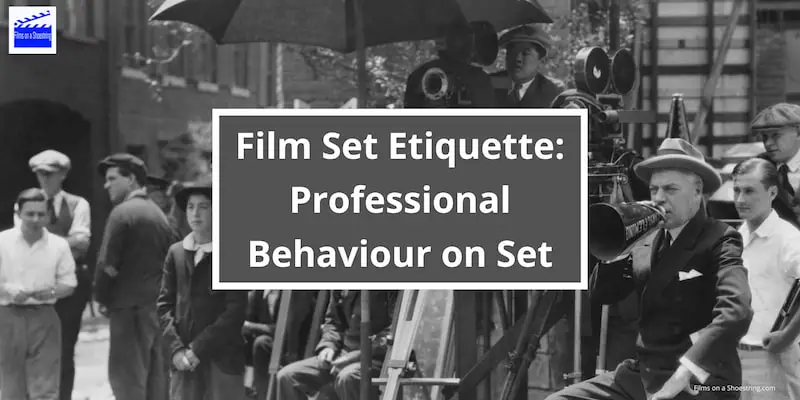Film set etiquette are the rights and wrongs of professional behaviour on set. Learn what’s expected – and what NOT to do!
Be Reliable
Applies to
- All Crew
- All Actors
- All Extras
Turn up on the right day, at the right time, with the right equipment.
You might be travelling, you might be on set for 5.30 a.m., but you need to be checked in by your call time. That usually means turning up 15-30 minutes before the call time.
Set multiple alarms, plan your route in advance, and account for any necessary preparations before heading to set.
You have been booked because you’re essential that day, so cancelling at the last moment causes very real problems for a lot of people.
Unreliable people are never, ever booked again. And word gets around.
10 Things NOT To Do On A Film Set: TV & Film Set Etiquette – Film Jams – YouTube
Be Prepared and Ready to Work
Applies to:
- All Crew
- All Actors
- All Extras
You’ve been booked to do a job with very tight deadlines, so prepare in advance.
If you’re crew, be sensibly dressed for the conditions and bring key equipment. Actors need to have learned their lines. Extras must remember the three outfits, array of big hats, or whatever costumes and props they have been asked to bring.
Respect the AD’s Instructions
Applies to
- All Crew
- All Actors
- All Extras
On set, the AD is your boss.
The 1st AD (Assistant Director) may be supported by up to three or four ADs. While the Director is busy working creatively with the DoP and actors, the AD makes sure everything is getting done, and getting done safely.
Listen to their instructions. They might be stressed, they might be blunt, but they have a limited amount of time to get a lot done.
Don’t Touch Gear (Unless It’s Your Job)
Applies to
- All Crew
- All Actors
- All Extras
As Assistant Directors (ADs) and heads of department have resposibility for safety on set.
If you touch a hot lamp and burn yourself, trip over a cable in a part of the set you had no right to be, or break an expensive piece of equipment, you’re causing trouble for everyone.
Don’t chatter on the Walkie Talkie
Applies to
- All Crew
Time is money, so those scenes need to be wrapped asap.
You’re there to do a job, even as an unpaid runner, so concentrate. Talking in the background means you’re not concentrating, you’re distracting others, and your noise might be picked up by the sound equipment at the wrong time.
Don’t use your cell phone/mobile on set
Applies to
- All Crew
- All Actors
- All Extras
Your cellphone/mobile should only be used for calls or text about the production, unless you’re away from set.
Again, you’re there to do a job, and need to concentrate on your job. Your phone could interrupt filming, so only use it in your trailer, extras tent, or away from the set.
There’s nothing worse that discovering in post-production that someone had a mobile on silent which vibrated every few minutes. We’ve been there. It cost time and money.
Don’t Walk In Front of the Camera
Applies to
- All Crew
- All Actors
- All Extras
There’s a short list of people who need to be seen on camera, and a long list of people behind it.
At some point, the actors and extras have to be in front of the camera to act in their scenes. They’ll be told when and where to be, with marks on the ground for measuring movement.
Everyone else needs to stay out of the way.
If it’s impossible to go around the camera, then shout out ‘crossing’ before you pass in front of it, making sure to do this when the cameras aren’t rolling.
Don’t Argue
Applies to
- All Crew
- All Actors
- All Extras
Arguments delay filming and cause resentment.
It doesn’t matter if you’re an actor who doesn’t like the director’s instructions, or a crew member who has been asked to redo their work, keep your cool.
People quickly learn who is good to work with, and who the trouble makers are. If you’re seen as a problem on set, word quickly gets around.
Wear Sensible Footwear
Applies to
- All Crew
Film sets are workplaces with lots of equiment, so your footwear can keep you safe.
Sandals, flip flops, and high heels aren’t a good mix in an environment of heavy boxes, sharp metal objects and hours of standing.
Sneakers and steel toed shoes are mandatory.
Check Before Media File Wipe
Applies to:
- Camera Department
If you wipe a media file before backup, you might destroy a day’s film footage.
Always ask, as a minimum, the DoP (Director of Photography) and AC (First Assistant Camera) whether it’s OK to wipe the media file. Also check that the DIT, (Digital Imaging Technician) has taken a backup.
Communicate Effectively
Applies to:
- All Crew
- All Actors
- All Extras
People on set don’t have time to listen to long, garbled messages.
Film sets have a lot happening with tight deadlines. Say what you need to say politely and concisely. No one needs your life story.
More for Filmmakers
- Low Budget Filmmaking: More for Less
- Lighting Department Film Roles
- Shooting An Interview
- Documentary Editing
- What is Sound Design in Film?
- Color Grading for Documentary Series or Film
- Film Set Etiquette: Professional Behaviour on Set
- Observational Documentaries And Their Impact
- Essential Skills for Film Industry Professionals
- How to Create a Storyboard in 6 Simple Steps
- What Makes a Film Successful
- Breaking into the Film Industry without Experience
- Sports Documentary Filmmaking
- How to Create a Storyboard Using Sticky Notes
- Remove Background Noise From Video
- Why Do Filmmakers Use Clapper Boards?
- Indie Films
- Indie Filmmaking
- What is Post Production in Film
- Ken Burns Effect: Creating Eye-Catching Sequences





















